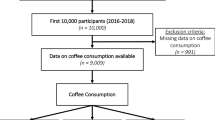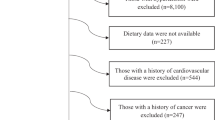Abstract
Background/Objectives:
Studies on the associations between coffee and green tea consumption and arterial stiffness are rare. This study evaluated the possible relationships between coffee and green tea consumption and brachial-ankle pulse wave velocity (ba-PWV) values in Japanese men.
Subjects/Methods:
In total, 540 eligible men who enrolled in the baseline survey of a cohort study in Tokushima Prefecture, Japan, and who underwent ba-PWV measurement were analyzed. Information about lifestyle characteristics including coffee and green tea intake were obtained from a structural self-administered questionnaire. Multiple linear regression analyses were used to evaluate the associations between coffee and green tea consumption and ba-PWV.
Results:
Subjects with greater coffee consumption were younger and showed higher proportions of current smoking and alcohol consumption. Subjects with greater green tea consumption were older and showed lower proportions of current smoking and alcohol consumption. Greater coffee consumption was significantly inversely associated with ba-PWV after the adjustment for probable covariates, including serum low-density lipoprotein cholesterol and high-density lipoprotein cholesterol (P for trend =0.031). After additional adjustment for serum triglycerides, this inverse association persisted, but was somewhat attenuated (P for trend =0.050). In contrast, green tea consumption was not associated with ba-PWV.
Conclusions:
Coffee consumption was inversely associated with arterial stiffness independent of known atherosclerotic risk factors, and this association was partly mediated by reduced circulating triglycerides. Further prospective or interventional studies are needed to confirm the causal association.
This is a preview of subscription content, access via your institution
Access options
Subscribe to this journal
Receive 12 print issues and online access
$259.00 per year
only $21.58 per issue
Buy this article
- Purchase on Springer Link
- Instant access to full article PDF
Prices may be subject to local taxes which are calculated during checkout
Similar content being viewed by others
References
Wada T, Kodaira K, Fujishiro K, Maie K, Tsukiyama E, Fukumoto T et al. Correlation of ultrasound-measured common carotid artery stiffness with pathological findings. Arterioscler Thromb 1994; 14: 479–482.
Lehmann ED . Clinical value of aortic pulse-wave velocity measurement. Lancet 1999; 354: 528–529.
van Popele NM, Grobbee DE, Bots ML, Asmar R, Topouchian J, Reneman RS et al. Association between arterial stiffness and atherosclerosis: the Rotterdam Study. Stroke 2001; 32: 454–460.
Kannel WB, McGee DL . Diabetes and cardiovascular disease. The Framingham study. JAMA 1979; 241: 2035–2038.
McNeill AM, Rosamond WD, Girman CJ, Golden SH, Schmidt MI, East HE et al. The metabolic syndrome and 11-year risk of incident cardiovascular disease in the atherosclerosis risk in communities study. Diabetes Care 2005; 28: 385–390.
Huxley R, Lee CM, Barzi F, Timmermeister L, Czernichow S, Perkovic V et al. Coffee, decaffeinated coffee, and tea consumption in relation to incident type 2 diabetes mellitus: a systematic review with meta-analysis. Arch Intern Med 2009; 169: 2053–2063.
Takami H, Nakamoto M, Uemura H, Katsuura S, Yamaguchi M, Hiyoshi M et al. Inverse correlation between coffee consumption and prevalence of metabolic syndrome: Baseline Survey of the Japan Multi-Institutional Collaborative Cohort (J-MICC) Study in Tokushima, Japan. J Epidemiol 2013; 23: 12–20.
Hino A, Adachi H, Enomoto M, Furuki K, Shigetoh Y, Ohtsuka M et al. Habitual coffee but not green tea consumption is inversely associated with metabolic syndrome: An epidemiological study in a general Japanese population. Diabetes Res Clin Practice 2007; 76: 383–389.
Matsuura H, Mure K, Nishio N, Kitano N, Nagai N, Takeshita T . Relationship between coffee consumption and prevalence of metabolic syndrome among Japanese civil servants. J Epidemiol 2012; 22: 160–166.
Iso H, Date C, Wakai K, Fukui M, Tamakoshi A, JACC Study Group. The relationship between green tea and total caffeine intake and risk for self-reported type 2 diabetes among Japanese adults. Ann Intern Med 2006; 144: 554–562.
Kokubo Y, Iso H, Saito I, Yamagishi K, Yatsuya H, Ishihara J et al. The impact of green tea and coffee consumption on the reduced risk of stroke incidence in Japanese population: the Japan public health center-based study cohort. Stroke 2013; 44: 1369–1374.
Wu JN, Ho SC, Zhou C, Ling WH, Chen WQ, Wang CL et al. Coffee consumption and risk of coronary heart diseases: a meta-analysis of 21 prospective cohort studies. Int J Cardiol 2009; 137: 216–225.
Kuriyama S, Shimazu T, Ohmori K, Kikuchi N, Nakaya N, Nishino Y et al. Green tea consumption and mortality due to cardiovascular disease, cancer, and all causes in Japan: the Ohsaki study. JAMA 2006; 296: 1255–1265.
Sone T, Kuriyama S, Nakaya N, Hozawa A, Shimazu T, Nomura K et al. Randomized controlled trial for an effect of catechin-enriched green tea consumption on adiponectin and cardiovascular disease risk factors. Food Nutr Res 2011; 55 doi:10.3402/fnr.v55i0.8326.
Hamajima N, J-MICC Study Group. The Japan Multi-Institutional Collaborative Cohort Study (J-MICC Study) to detect gene-environment interactions for cancer. Asian Pac J Cancer Prev 2007; 8: 317–323.
Ishikawa-Takata K, Tabata I . Exercise and physical activity reference for health promotion 2006 (EPAR2006). J Epidemiol 2007; 17: 177.
Tokudome S, Goto C, Imaeda N, Tokudome Y, Ikeda M, Maki S . Development of a data-based short food frequency questionnaire for assessing nutrient intake by middle-aged Japanese. Asian Pac J Cancer Prev 2004; 5: 40–43.
Tokudome Y, Goto C, Imaeda N, Hasegawa T, Kato R, Hirose K et al. Relative validity of a short food frequency questionnaire for assessing nutrient intake versus three-day weighed diet records in middle-aged Japanese. J Epidemiol 2005; 15: 135–145.
Goto C, Tokudome Y, Imaeda N, Takekuma K, Kuriki K, Igarashi F et al. Validation study of fatty acid consumption assessed with a short food frequency questionnaire against plasma concentration in middle-aged Japanese people. Scand J Nutr 2006; 50: 77–82.
Imaeda N, Goto C, Tokudome Y, Hirose K, Tajima K, Tokudome S . Reproducibility of a short food frequency questionnaire for Japanese general population. J Epidemiol 2007; 17: 1000–1007.
Tomiyama H, Yamashina A, Arai T, Hirose K, Koji Y, Chikamori T et al. Influences of age and gender on results of noninvasive brachial-ankle pulse wave velocity measurement–a survey of 12517 subjects. Atherosclerosis 2003; 166: 303–309.
Gómez-Ruiz JA, Leake DS, Ames JM . In vitro antioxidant activity of coffee compounds and their metabolites. J Agric Food Chem 2007; 55: 6962–6969.
Yamashina A, Tomiyama H, Takeda K, Tsuda H, Arai T, Hirose K et al. Validity, reproducibility, and clinical significance of noninvasive brachial-ankle pulse wave velocity measurement. Hypertens Res 2002; 25: 359–364.
Vlachopoulos C, Panagiotakos D, Ioakeimidis N, Dima I, Stefanadis C . Chronic coffee consumption has a detrimental effect on aortic stiffness and wave reflections. Am J Clin Nutr 2005; 81: 1307–1312.
Vlachopoulos CV, Vyssoulis GG, Alexopoulos NA, Zervoudaki AI, Pietri PG, Aznaouridis KA et al. Effect of chronic coffee consumption on aortic stiffness and wave reflections in hypertensive patients. Eur J Clin Nutr 2007; 61: 796–802.
Ochiai R, Jokura H, Suzuki A, Tokimitsu I, Ohishi M, Komai N et al. Green coffee bean extract improves human vasoreactivity. Hypertens Res 2004; 27: 731–737.
Nakanishi N, Tatara K, Nakamura K, Suzuki K . Association of lifestyle with serum lipid levels: a study of middle-aged Japanese men. J Epidemiol 2000; 10: 216–225.
Olthof MR, Hollman PC, Katan MB . Chlorogenic acid and caffeic acid are absorbed in humans. J Nutr 2001; 131: 66–71.
Lee DH, Blomhoff R, Jacobs DR Jr . Is serum gamma glutamyltransferase a marker of oxidative stress? Free Radic Res 2004; 38: 535–539.
Yamashita K, Yatsuya H, Muramatsu T, Toyoshima H, Murohara T, Tamakoshi K . Association of coffee consumption with serum adiponectin, leptin, inflammation and metabolic markers in Japanese workers: a cross-sectional study. Nutr Diabetes 2012; 2: e33.
Bravo L . Polyphenols: chemistry, dietary sources, metabolism, and nutritional significance. Nutr Rev 1998; 56: 317–333.
Wang QM, Gong QY, Yan JJ, Zhu J, Tang JJ, Wang MW et al. Association between green tea intake and coronary artery disease in a Chinese population. Circ J 2010; 74: 294–300.
Hirano R, Momiyama Y, Takahashi R, Taniguchi H, Kondo K, Nakamura H et al. Comparison of green tea intake in Japanese patients with and without angiographic coronary artery disease. Am J Cardiol 2002; 90: 1150–1153.
Ryu OH, Lee J, Lee KW, Kim HY, Seo JA, Kim SG et al. Effects of green tea consumption on inflammation, insulin resistance and pulse wave velocity in type 2 diabetes patients. Diabetes Res Clin Pract 2006; 71: 356–358.
Acknowledgements
We thank the following researchers for providing us the useful food frequency questionnaire and a program to calculate nutrient intake; Shinkan Tokudome at the National Institute of Health and Nutrition (formerly Nagoya City University), Chiho Goto at the Nagoya Bunri University, Nahomi Imaeda at the Nagoya Women's University, Yuko Tokudome at the Nagoya University of Arts and Sciences, Masato Ikeda at the University of Occupational and Environmental Health, Shinzo Maki at Aichi Prefectural Dietetic Association. This study was supported in part by Grants-in-Aid for Scientific Research on Priority Areas of Cancer (No. 17015018) and on Innovative Areas (no. 221S0001) from the Japanese Ministry of Education, Culture, Sports, Science and Technology.
Author information
Authors and Affiliations
Corresponding author
Ethics declarations
Competing interests
The authors declare no conflict of interest.
Rights and permissions
About this article
Cite this article
Uemura, H., Katsuura-Kamano, S., Yamaguchi, M. et al. Consumption of coffee, not green tea, is inversely associated with arterial stiffness in Japanese men. Eur J Clin Nutr 67, 1109–1114 (2013). https://doi.org/10.1038/ejcn.2013.132
Received:
Revised:
Accepted:
Published:
Issue Date:
DOI: https://doi.org/10.1038/ejcn.2013.132
Keywords
This article is cited by
-
Inverse association between soy food consumption, especially fermented soy products intake and soy isoflavone, and arterial stiffness in Japanese men
Scientific Reports (2018)
-
Biomarkers of the metabolic syndrome: influence of selected foodstuffs, containing bioactive components
Phytochemistry Reviews (2018)



